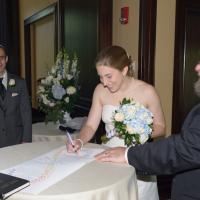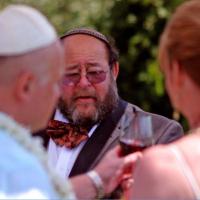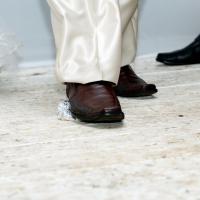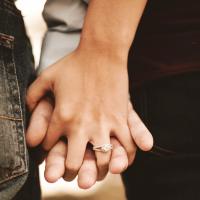Rabbi Richard Winer considers interfaith wedding ceremonies to be a beautiful bridge of two cultures on both a spiritual and emotional level. For so many brides and grooms, it’s important to stay true to their roots, which is why Rabbi Winer works to incorporate aspects from both heartfelt traditions.
So whether you are looking to have a Jewish wedding or interfaith wedding, Rabbi Winer is open to new ideas and ways of accommodating your wishes.
Learn More About Rabbi Winer's Services
Ketubah Ceremony (כְּתֻבָּה) »
The Ketubah is a contract between between the bride and groom. A traditional Ketubah deals with the groom’s financial obligation to the bride as well as the obligation to provide for her needs. The modern Ketubah is written both in Hebrew and English and is signed by the bride and groom as well as two witnesses that are not relatives. The Ketubah ceremony involves a brief explanation of the customs of the Ketubah and the signing of the Ketubah. It is performed in front of the immediate…
Click here to read more.The Chuppah (חֻפָּה) »
The Jewish ceremony itself is held under the Chuppah, a Hebrew word for “canopyâ€, which can be either stationary and supported by a semi permanent structure or a more traditional canopy held by four people.
The traditional Chuppah is usually made of a tallit supported by four hand held poles. The word “Chuppah†is synonymous with the Jewish wedding itself. A traditional Jewish blessing of children is: “May you grow to stand under the Chuppah.†Since this kind of…
Click here to read more.The Ring Ceremony (טַבַּעַת) »
A main part of the wedding is the ring ceremony. According to Jewish law the bride’s ring must be acquired by the groom. The bride’s acceptance of the ring which the groom places on her left index finger, is the act of legally binding the agreement of the marriage.
The placing of the ring on the index finger of the left hand, the closest hand to the heart, symbolizes that the bride agrees to the marriage with all her heart. The bride then places a ring on the left index finger of the…
Click here to read more.The Seven Blessings (שבע ברכות) »
At the end of the wedding (as under the Chuppah) Sheva Brakhot (7 blessings) are chanted. These blessings are part of the Birkat HaMazon (Grace after Meals) said after the meal over a glass of wine.
The glass of wine is passed around through the guests to 7 people the couple want to honor and each one says one of the Brakhot (blessings).
For the next 7 days (including the wedding night), Sheva Brakhot continue, usually at the homes of friends, who throw these parties for the new couple. In order…
Click here to read more.Breaking the Glass (שְׁבִירַת כּוֹס) »
To conclude the wedding ceremony, it is a Jewish custom to break a glass, this is to remind us even in moments of great joy we should not be forgetful of the moments of destruction and sadness.
A loving relationship involves not only sharing the good and happy times, but also s haring the difficult and painful times. May your love for each other never fail…but grow deeper and stronger through all of life’s varied experiences.
Click here to read more.Marriage License Information »
Anyone planning to be wed in Massachusetts requires a current marriage license issued by the Commonwealth of Massachusetts whether or not you live within the state.
This license does not have to be from the town that you are getting married in or the town in which you currently reside. It is necessary to apply together in person “to file your intentions†with any city or town clerk. Massachusetts requires the couple be over the age of 18. Same-sex marriage is legal, however only for…
Click here to read more.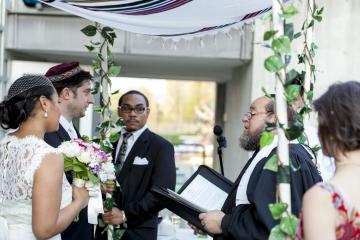
On several occasions, Rabbi Winer has co-officiated weddings with clergy of other faiths providing a unique ceremony that was meaningful to both families.
In the end, it’s truly about respecting the expression of love and unity shared between the bride and groom. It is, therefore, important to tailor your ceremony according to what will make you and your loved one happy, first and foremost. It’s not uncommon for some couples to desire no religious traditions during their wedding ceremony.
Rabbi Winer is here to listen to what you have to say—no matter what level of religious or spiritual element that entails, and create your individualized ceremony. You’ll find that when looking for any wedding officiant, it’s important to ensure your officiant is able to guide you through a collaborative process where everyone feels heard.



